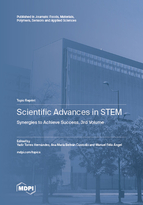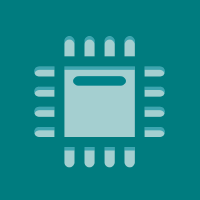Topic Menu
► Topic MenuTopic Editors



Scientific Advances in STEM: Synergies to Achieve Success, 3rd Volume

A printed edition is available here.
Topic Information
Dear Colleagues,
Following the previous special topics (scientific advances in STEM: from professors to students, 1st and 2nd editions), this new topic tries to highlight the importance of establishing synergies between research groups from different disciplines, combining the scientific knowledge from basic to applied research, as well as taking advantage of different research facilities. Fundamental science helps to understand the phenomenological basics, while applied science focuses on products and technology developments, highlighting the need to transfer knowledge to society and industrial sectors. This topic integrates interdisciplinary research of science and technology, including, but not limited to the following topics:
- Science and technology of materials
- Physics and applied mathematics
- Industrial and environmental chemistry
- Analytic chemistry
- Intelligent systems and electronic technology
- Product design, development, and engineering
- Computerized, robotic, and neuromorphic industrial systems
- Computer architecture and technology Particular Themes
- Coatings and nanostructured materials
- Development of functional materials for additive manufacturing (i.e., applications in biomedicine)
- Advanced optical characterization or nano- and microstructures and thin films
- Biopolymer from agro-food bioresidues
- Interfacial rheology and its applications
- Deep-learning systems for diagnosis, prevention, and pattern recognition
- Bio-inspired systems for sensory fusion and control
- Artificial intelligence in smart-city applications
- Energy forecasting and flexibility services
- Advances in food and by-product development and characterization
- New trends in sustainable cities and industries
- Intelligent and sustainable optimization of industrial engineering projects
- Multifunctional and smart toys for children with autism spectrum disorder
- Weighting with life cycle assessment and cradle-to-cradle (methodology for global sustainability design social and socio-economic life cycle assessment: towards quantitative methods in small and medium-sized enterprises)
- Analysis of emerging pollutants in environmental samples
- Biomechanical and biofunctional behaviour of porous materials
Dr. Ana María Beltrán Custodio
Dr. Manuel Félix Ángel
Topic Editors
Keywords
- solar energy applications
- additive manufacturing
- superficial modification
- functional materials
- tribo-mechanical behaviour
- bio residues, biopolymer
- computer architecture
- artificial intelligence
- smart cities
- food
- sustainable cities and industries
- life cycle assessment
- emerging pollutants
- cellular and bacterial behaviour
- powder technology
Participating Journals
| Journal Name | Impact Factor | CiteScore | Launched Year | First Decision (median) | APC |
|---|---|---|---|---|---|

Foods
|
5.1 | 8.7 | 2012 | 14.9 Days | CHF 2900 |

Materials
|
3.2 | 6.4 | 2008 | 15.2 Days | CHF 2600 |

Polymers
|
4.9 | 9.7 | 2009 | 14 Days | CHF 2700 |

Sensors
|
3.5 | 8.2 | 2001 | 19.7 Days | CHF 2600 |

Applied Sciences
|
2.5 | 5.5 | 2011 | 19.8 Days | CHF 2400 |

Preprints.org is a multidisciplinary platform offering a preprint service designed to facilitate the early sharing of your research. It supports and empowers your research journey from the very beginning.
MDPI Topics is collaborating with Preprints.org and has established a direct connection between MDPI journals and the platform. Authors are encouraged to take advantage of this opportunity by posting their preprints at Preprints.org prior to publication:
- Share your research immediately: disseminate your ideas prior to publication and establish priority for your work.
- Safeguard your intellectual contribution: Protect your ideas with a time-stamped preprint that serves as proof of your research timeline.
- Boost visibility and impact: Increase the reach and influence of your research by making it accessible to a global audience.
- Gain early feedback: Receive valuable input and insights from peers before submitting to a journal.
- Ensure broad indexing: Web of Science (Preprint Citation Index), Google Scholar, Crossref, SHARE, PrePubMed, Scilit and Europe PMC.

